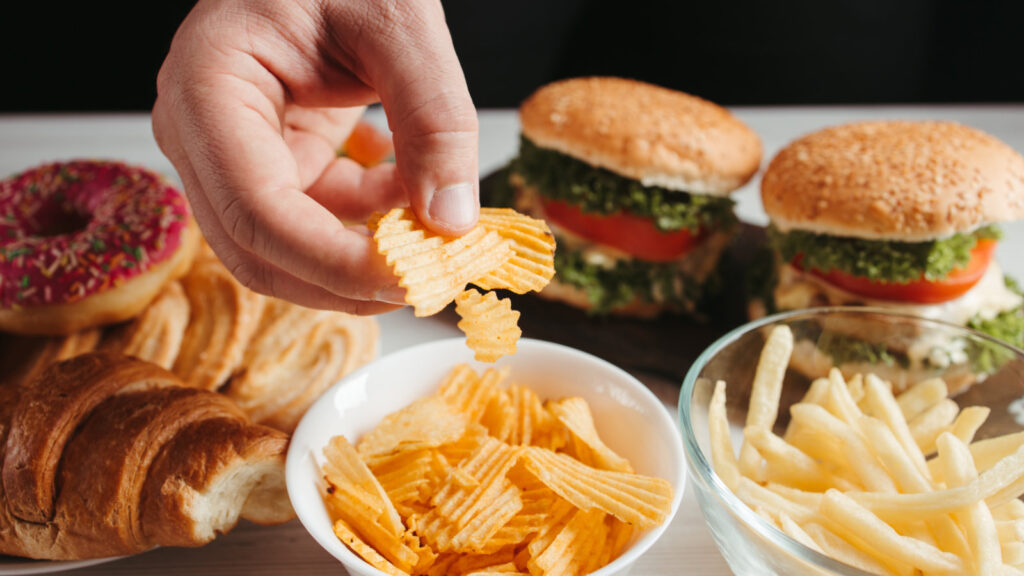Losing weight can be a challenging journey, especially if progress feels slow or nonexistent.
Often, the issue isn’t lack of effort but unknowingly making mistakes that hinder results.
In this guide, we’ll explore the top 15 mistakes that could be slowing down your weight loss and how to fix them.
By identifying these roadblocks, you can accelerate your progress and achieve your goals more effectively.
1. Underestimating Portion Sizes

Portion control plays a crucial role in weight loss, but many people misjudge how much they’re eating.
Even healthy foods like nuts, avocados, or whole grains can lead to weight gain if consumed in large amounts.
Solution: Use measuring cups, food scales, or visual cues to gauge portion sizes accurately.
With practice, you’ll learn to estimate portions more effectively without measuring every meal.
2. Skipping Meals

Skipping meals might seem like a shortcut to cutting calories, but it often backfires.
When you go too long without eating, you’re more likely to overeat later, making it harder to maintain a calorie deficit.
Solution: Aim to eat balanced meals at regular intervals. Include a mix of protein, healthy fats, and complex carbohydrates to stay full and energized throughout the day.
3. Not Tracking What You Eat

Many people underestimate their calorie intake because they’re not keeping track of everything they eat.
Small snacks, condiments, or high-calorie beverages can add up quickly.
Solution: Use a food diary or an app to log your meals and snacks.
This habit increases awareness and helps you identify areas for improvement.
4. Focusing Only on Cardio

Cardiovascular exercises like running or cycling are excellent for burning calories, but relying solely on cardio can stall progress.
Strength training is essential for building muscle, which boosts your metabolism and helps burn more calories at rest.
Solution: Incorporate strength training into your routine at least 2-3 times a week. Combine it with cardio for a balanced approach.
5. Neglecting Sleep

Sleep is often overlooked in weight loss, but it’s a vital factor. Poor sleep disrupts hormones that regulate hunger and satiety, leading to increased cravings and overeating.
Solution: Prioritize 7-9 hours of quality sleep each night. Create a bedtime routine, limit screen time, and keep your sleep environment comfortable.
6. Not Drinking Enough Water

Staying hydrated is essential for metabolism and appetite control. Dehydration can be mistaken for hunger, causing you to eat when you’re actually thirsty.
Solution: Aim to drink at least 8 cups (2 liters) of water daily. Carry a water bottle and take sips throughout the day.
7. Relying on Processed “Diet” Foods

Many “diet” or “low-fat” foods are heavily processed and contain added sugars or artificial ingredients that can hinder weight loss.
Solution: Focus on whole, minimally processed foods like vegetables, fruits, lean proteins, and whole grains. These provide more nutrients and keep you feeling full longer.
8. Eating Too Quickly

Eating quickly can prevent your brain from registering fullness, leading to overeating. It takes about 20 minutes for the brain to signal that you’re satisfied.
Solution: Slow down and savor each bite. Put your fork down between bites and chew thoroughly to give your body time to recognize fullness.
9. Ignoring Stress Management

Chronic stress increases cortisol levels, which can lead to weight gain, particularly around the belly area. Stress also triggers emotional eating, making it harder to stay on track.
Solution: Incorporate stress management techniques such as meditation, yoga, deep breathing, or journaling into your daily routine.
10. Setting Unrealistic Goals

Expecting rapid results can lead to frustration and demotivation. Weight loss is a gradual process, and setting unattainable goals often leads to giving up.
Solution: Focus on achievable goals, such as losing 1-2 pounds per week. Celebrate small victories along the way to stay motivated.
11. Overestimating Calorie Burn from Exercise

Many people overestimate how many calories they burn during workouts, leading to overeating or compensating with extra food.
Solution: Use a heart rate monitor or fitness tracker for a more accurate estimate of calorie burn. Remember, weight loss is primarily driven by diet, not exercise.
12. Drinking Your Calories

Sugary drinks, alcohol, and even some smoothies can pack in hundreds of calories without providing much satiety. These liquid calories can stall your weight loss.
Solution: Stick to water, unsweetened tea, or black coffee. If you enjoy smoothies, focus on low-calorie ingredients like greens and berries.
13. Inconsistent Effort

Consistency is key in weight loss, but it’s common to fluctuate between being highly disciplined and completely lax. This inconsistency slows progress.
Solution: Create a sustainable routine you can stick to long-term. Avoid extreme diets or workout plans that aren’t practical for your lifestyle.
14. Relying Solely on Willpower

Willpower is finite, and relying on it alone to resist temptation can lead to burnout. An environment full of unhealthy choices makes it harder to stay on track.
Solution: Plan ahead and set up your environment for success. Keep healthy snacks accessible and limit exposure to tempting, calorie-dense foods.
15. Not Seeking Support

Weight loss can feel isolating if you try to do it alone. Lack of support often leads to discouragement and giving up.
Solution: Surround yourself with a supportive network of friends, family, or a fitness community. Consider working with a coach or joining a weight-loss group for accountability.
FAQs: Overcoming Weight Loss Roadblocks
Q: How can I tell if I’m making these mistakes?
Start by keeping a detailed food and activity log for a week. This will help you spot patterns and areas for improvement.
Q: What’s the fastest way to fix these mistakes?
Focus on one or two mistakes at a time. Small, consistent changes are more sustainable than trying to fix everything at once.
Q: How long does it take to see weight loss results?
Results vary depending on your starting point and consistency. On average, losing 1-2 pounds per week is a healthy and realistic goal.
Q: Should I avoid carbs or fats to lose weight faster?
No. Balance is key. Both carbs and fats are essential nutrients. Instead of avoiding them, focus on portion sizes and choosing healthier options.
Q: What if I’m still not losing weight after addressing these mistakes?
If progress remains slow, consider consulting a healthcare professional or registered dietitian. They can help identify any underlying issues, such as hormonal imbalances or medical conditions.
Final Thoughts: Taking Charge of Your Weight Loss Journey
Weight loss is a complex process influenced by many factors.
By recognizing and addressing these common mistakes, you can create a sustainable plan that works for you.
Remember, progress takes time, and consistency is the ultimate key to success.
Keep learning, adapting, and celebrating your achievements along the way.
